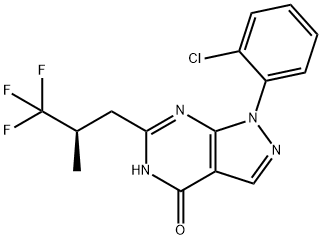BAY 73-6691 was characterized in vitro as the first potent and selective inhibitor of phosphodiesterase 9 (PDE9), which is currently under preclinical development for the treatment of Alzheimer′s disease. This compound selectively inhibits human (IC50 = 55 nM) and murine (IC50 = 100 nM) PDE9 activity in vitro and shows only moderate activity against other cyclic nucleotide-specific phosphodiesterases. BAY 73-6691 alone did not significantly increase basal cGMP levels. The PDE9 inhibitor significantly potentiated the cGMP signals generated by sGC activating compounds such as BAY 58-2667 or 5-cyclopropyl-2-[1-(2-fluorobenzyl)-1H-pyrazolo[3,4-b]pyridin-3-yl]pyrimidin-4-ylamine (BAY 41-2272) and induced leftward shifts of the corresponding concentration-response curves. The newly generated PDE9 reporter cell line show that BAY 73-6691 is able to efficiently penetrate cells and to inhibit intracellular PDE9 activity.

